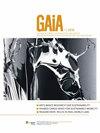Wie entfalten Reallabore Wirkung für die Transformation? Eine embedded-agency perspective zur Analyse von Wirkmechanismen in Reallaboren
IF 1.9
4区 社会学
Q4 ENVIRONMENTAL SCIENCES
引用次数: 1
Abstract
Reallaborforschung hat ein zentrales Anliegen: sozial robustes Transformationswissen inter- und transdisziplinär herzustellen. Dafür braucht es einen Analyserahmen, der Ansätze aus verschiedenen Disziplinen integriert, um Mechanismen des Wandels systematisch zu ermitteln. Mithilfe der embedded-agency perspective können Reallaborprozesse so konzipiert werden, dass relevante Daten integriert erhoben werden, eine Wirkungsabschätzung gewährleistet ist und auch die Vergleichbarkeit von Reallaboren unterstützt wird.The central concern of real-world lab research is the inter- and transdisciplinary generation of socially robust transformation knowledge. Despite the fact that real-world labs explore and study fundamental mechanisms of change, there are few approaches that deal with this question from a systematic, theoretical and methodological perspective. Concrete real-world lab projects should be able to live up to their claim as a central research mode, supporting sustainability transformations. Thus, approaches are required that foster a broader understanding of mechanisms of change in real-world labs. We find promising approaches that describe mechanisms of change along discipline-specific analytical and empirical scales. Key challenges are to develop analytical frameworks that integrate such approaches from different disciplines, and to identify mechanisms of change in a systematic and comprehensive way. In this article we present an embedded-agency perspective for analysing mechanisms of change in real-world labs and discuss the methodological implications. With the help of this analytical framework, real-world lab processes can be designed in such a way that relevant data is collected and transformative impacts can be assessed."现实世界"怎样可以促进转型?可以透视现实世界中的实际机制
Anliegen的真实实验室:因此,强大的转换能力是跨部门和跨部门的。Dafür braucht是一家分析公司,该公司是一家综合性的公司,也是一家系统化的公司。嵌入机构的视角是真实实验室项目的关键,根据相关的Daten integriert erhoben werden、eine Wirkungsabschätzung gewährleistet和真实实验室的Vergleichbarkit。现实世界实验室研究的核心关注点是跨学科和跨学科生成社会稳健的转化知识。尽管现实世界的实验室探索和研究了变化的基本机制,但很少有方法能从系统、理论和方法的角度来处理这个问题。具体的现实世界实验室项目应该能够实现其作为中心研究模式的主张,支持可持续性转型。因此,需要有方法来促进对现实世界实验室中变化机制的更广泛理解。我们发现了一些很有前景的方法,可以沿着特定学科的分析和经验尺度来描述变化机制。关键挑战是制定分析框架,将不同学科的这种方法结合起来,并以系统和全面的方式确定变革机制。在这篇文章中,我们提出了一个嵌入式机构的视角来分析现实世界实验室中的变化机制,并讨论了方法论意义。在这个分析框架的帮助下,可以设计真实世界的实验室流程,从而收集相关数据并评估变革影响。
本文章由计算机程序翻译,如有差异,请以英文原文为准。
求助全文
约1分钟内获得全文
求助全文
来源期刊

Gaia-Ecological Perspectives for Science and Society
ENVIRONMENTAL SCIENCES-
CiteScore
2.30
自引率
18.80%
发文量
43
审稿时长
>12 weeks
期刊介绍:
GAIA is a peer-reviewed inter- and transdisciplinary journal for scientists and other interested parties concerned with the causes and analyses of environmental and sustainability problems and their solutions.
Environmental problems cannot be solved by one academic discipline. The complex natures of these problems require cooperation across disciplinary boundaries. Since 1991, GAIA has offered a well-balanced and practice-oriented forum for transdisciplinary research. GAIA offers first-hand information on state of the art environmental research and on current solutions to environmental problems. Well-known editors, advisors, and authors work to ensure the high quality of the contributions found in GAIA and a unique transdisciplinary dialogue – in a comprehensible style.
 求助内容:
求助内容: 应助结果提醒方式:
应助结果提醒方式:


